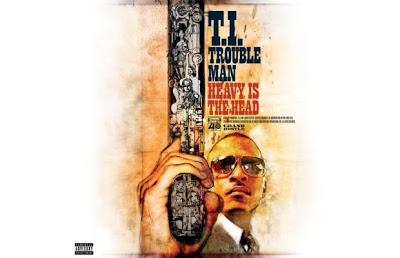
The King Is Back
T.I.'s Trouble Man: Heavy Is the Head
After the various trials and tribulations T.I. has undergone these past few years, he has finally returned to hip-hop’s forefront, with hopes of reestablishing himself as the King of the South. On his latest effort Trouble Man: Heavy Is the Head, T.I. tries to mix his hardcore, street bangers that made him famous with a more mature, humble consciousness. He succeeds at providing a little something for everyone on this album, but does it fully connect on all levels and flow together as one story?On The Introduction, T.I. wastes no time in attacking the instrumental as if he’s hungrier than ever before. His energy preps listeners for the tracks to come, as he brings back the excitement and eagerness to hear what he still has left in the tank. From the intro, T.I. jumps into G Season, which features Meek Mill. Once again, the energy remains high as he comes with an aggressive, hustler’s approach. Trap Back Jumpin, T.I.’s lead single off the album, further extends the excitement.
As the album reaches track number four, Wildside, which features A$AP Rocky, the tempo slows a little and adjusts listeners into a more lyrical, real-life presence. Although this is a refreshing track at this point on the album, it awkwardly transitions into the club-friendly single off the album, Ball, which features Lil Wayne. On one track, T.I. comes with a mature, honest approach, and then on the very next, provides a club joint promoting the use of ecstasy and alcohol. These are the contradictions and inconsistencies that haunt the album’s overall solidity.
From here, T.I. links up with hip-hop legend Andre 3000 on Sorry. T.I. does contribute some heartfelt, intelligent lyricism on this track, however fails to match Andre 3000’s creativity and dominance. Overall a good cut, the song is one of the more important tracks on the album, as it addresses mistakes he had made in the past and his plans to correct them. T.I. flows effortlessly on the smooth, R. Kelly-assisted Can You Learn, for a nice bluesy track on the album. This is followed by the single Go Get It, which once again showcases T.I.’s ability to amp up his listeners and prove his relevance to today’s rap scene.
P!nk makes an appearance on Guns and Roses, which may be one of the most relatable songs on the album. The subject discusses a man and woman who are caught up in a bad relationship neither one of them can step away from. This track is both girl and guy-friendly, and P!nk’s catchy hook makes it unforgettable. The Way We Ride sends T.I. back to his southern roots, as it features a slowed-down, chopped and screwed-style chorus. From here the album hits a definite low point, as T.I. attempts to make a sing-along type R&B cut for the ladies, Cruisin’. The song fails to capture the females’ attention, the lyrical content is terrible, and the production is sub-par. Fortunately T.I. rebounds nicely on Addresses, where he takes a shot at the people who have doubted him over the years.
Similarly, on Hello, which features CeeLo Green, T.I. addresses the many haters he has came to meet over the years, due to both his peaks and valleys. On Who Want Some, T.I. stays with his mean, intense approach, though the song feels a tad repetitive at this point on the album. The next three tracks, Wonderful Life featuring Akon, Hallelujah, and Love This Life all showcase T.I.’s appreciation for family, friends, and the good things life has to offer. He assassinates his alter ego (T.I.P.), and looks to move forward in a positive, trouble-free light. His heart shines through on all three tracks, as he introduces his fans to the person behind the rapper, and the good man behind the more commonly perceived bad guy.
The album closes with the single Like That, which feels a bit unneeded after the three honest, humbly approached cuts. Obviously, the purpose was to end the album on a high-energy note, trying to excite his fans even more for what is to come. After just a single listen to Trouble Man, it is clear that the King is back, and has matured leaps and bounds over the past few years. He may never sound as pure or genuine as he once did earlier in his career, but at least the flare is back and the hunger has returned. Although slightly contradictory, and inconsistent from track to track, T.I.’s Trouble Man: Heavy Is the Head serves as one of the better albums on his music catalog.
RRR Score: 8/10
Written and reviewed by Seth Kaplan
